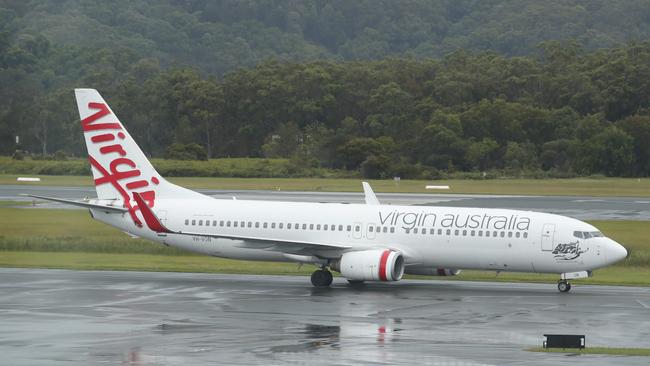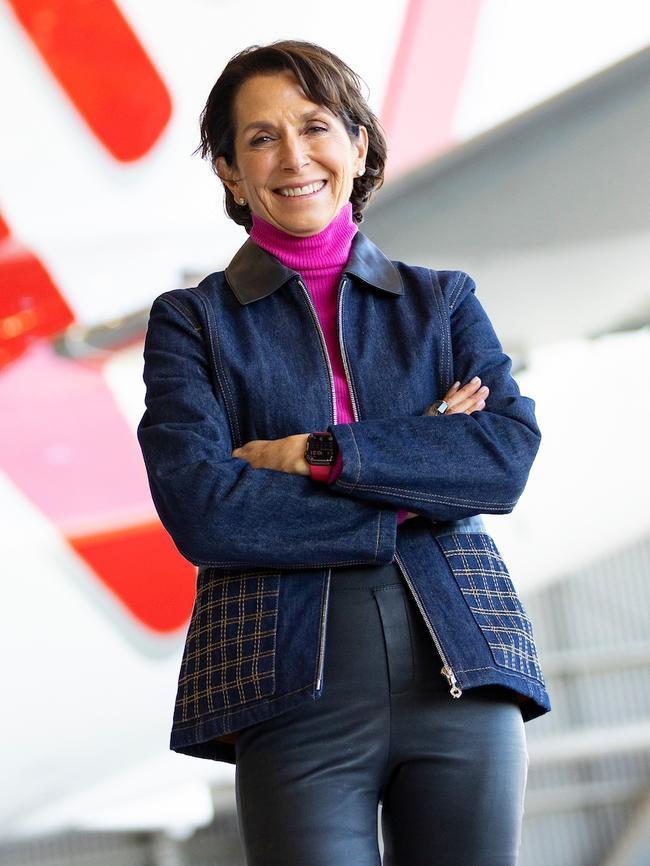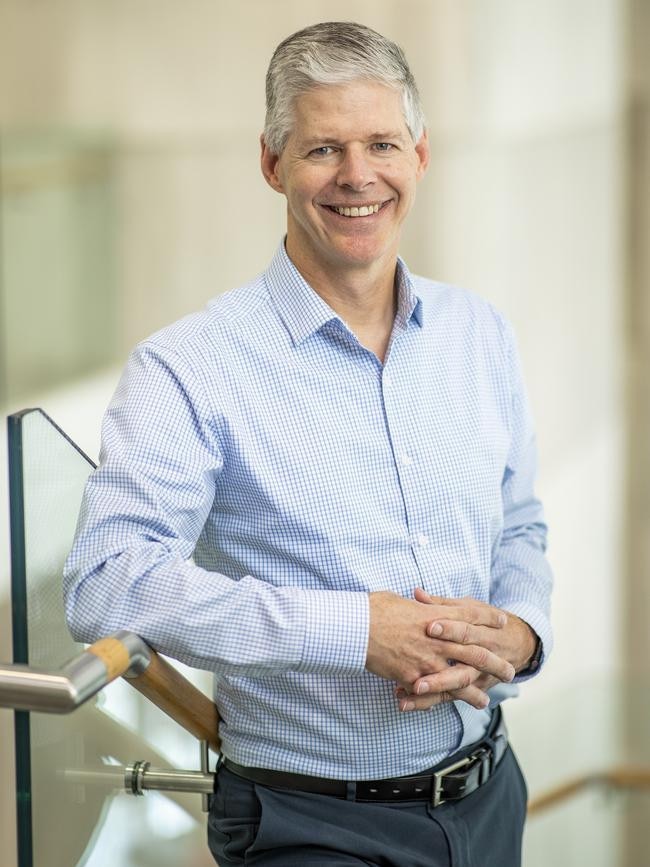Virgin Australia’s owners Bain Capital wants to be ‘Qantas-concentrated’ not Qantas-lite
The airline’s private equity backers have been smart enough to structure Virgin’s blockbuster float in a way to give it the best chance to battle its bigger rival.

The blockbuster $2.3bn float of Virgin Australia is finally locked and loaded, ready to launch by the end of this month.
The branding is the same, however this rebuilt airline is fundamentally different from the one that collapsed in the midst of the Covid-19 pandemic. To drive this home, even the old stock exchange ticker has been cast aside for a newly minted one. No longer VAH, Virgin will be relisted as VGN.
Institutional investors have got a taste of what’s to come, with private equity major Bain Capital sending Virgin’s new chief executive Dave Emerson out to big investors to drum up support for the listing ahead of this week lodging of the prospectus.
So far they’ve been bowled over by big investors including local super funds, with the institutional bookbuild of the $685m IPO already effectively covered before it opened on Wednesday.
Its been nearly five years in the making, as Bain seriously tested for support for a listing across the past two years. It was last year’s international alliance with Qatar and then installing a new chief were the two final strategic pieces that fell into place.
Importantly, Bain has been careful to structure the Virgin float to succeed. This is a nod that despite equity markets trading near record levels, the IPO market remains fragile.
Virgin’s new shares will be priced at $2.90 each, according to a term sheet sent institutions.
This represents a very modest seven times Virgin’s pro forma financial year 2025 earnings and a hefty 30 per cent discount to the current year multiple carried by big rival Qantas.
Compare this with a high-priced benchmark S&P/ASX 200 that’s trading at over 18 times largely thanks to the big four banks. This makes Virgin a standout for new investors looking for a bargain buy.

Virgin is expected to be marketed as “concentrated Qantas”, rather than the pre-Covid airline of “Qantas-lite” where it was trying to challenge Qantas as a full service airline but without the balance sheet. This means Virgin Mark 2 has been putting most of its efforts on just two key market segments. High-volume domestic travel and the Velocity loyalty program.
The reason is margin. These two business lines are also the most lucrative for Qantas. Domestic last year generated margins of around 15 per cent, for Qantas and its giant Frequent Flyer program fetches margins of around 20 per cent. Over at Qantas international profit margins drop to 6.4 per cent. Meanwhile, its Jetstar unit, which includes domestic and a large international footprint, averages out to margins of 10 per cent.
Virgin still has some international exposure, although this is very limited and capital light. It flies direct to tourism hubs Queenstown or Bali while last year’s global alliance with Qatar gives Virgin a lucrative European feeder option without the cost. The Middle Eastern airline will supply the aeroplane kit and crew in the early years with Virgin selling tickets into Europe without the high upfront costs.
Behind the scenes, Virgin has been able to rebuild from the ground up to make it as efficient as possible post-Covid. Gone are the discount operations Tiger Air as well as the luxury chairman’s lounges. Also gone are marginal routes and a more expansive international network. Emerson, a former senior partner with consultants Bain & Co, has been telling investors there’s more fundamental transformational work to be done. However, today’s Virgin is far more profitable.
Recently released December half revealed Virgin posted record earnings for the period of $439m, with revenue of $3bn. While the December half is traditionally more profitable, it annualises at more than $800m earnings struck on nearly $6bn in revenue. These numbers already put it ahead of Virgin’s pre-pandemic revenue peak of $5.8bn.
Virgin shares are initially expected to trade at a discount to Qantas, but by pursuing the only the markets that generate the best returns, Virgin’s backers are betting over time they will soon close the gap or potentially trade at a premium. The other side to this is if Qantas didn’t have exposure to the more volatile international business, it would trade at a higher valuation even as a smaller airline.
Big IPOs set the tone
Last year’s Guzman Y Gomez initial public offer set the template for structuring a post-Covid IPO. Here its about squeezing supply to keep demand high. The fast-food player mastered this perfectly selling less than 10 per cent of its shares into the IPO, ensuring there was a day one surge.
Virgin will see a relatively tight 30 per cent of the company sold in the offer, that guaranteeing support for demand.
Bain and its co-investors (including Richard Branson’s Virgin Group and Queensland Investment Corp) will retain a 40 per cent stake in the newly listed Virgin. Qatar will hold a 23 per cent stake (valued on paper at $530m). Management, employees and former management (including former boss Jayne Hrdlicka, who stepped down this year) will hold 6.4 per cent. This includes a $3000 share grant that’s soon to come the way of every Virgin employee.
That leaves just $685m of shares available for new investors wanting to get a slice of the action. This will be carved up between big fund managers and retail investors.

Barrenjoey was the one that took GYG to market and is also on the Virgin float as co-joint lead manager. Other lead managing banks are UBS and Goldman Sachs. Reunion Capital is a financial adviser to Bain.
Bain has committed to hold its stake under escrow until the end of June new year; by then it can sell 25 per cent of its holdings, providing the shares are trading at least 20 per cent higher than the offer price. This gives Bain an additional incentive to keep the Virgin shares modestly priced for medium term gains.
The market returns will be all blue sky for Bain, which has more than recouped the $700m capital it put in from the $3.5bn acquisition, with the bulk of that taking on debt. Bain has since taken an estimated $1bn in dividends from Virgin in the four-and-a-half years of ownership and the Qatar selldown represented another windfall gain.
Make no mistake, the bet on Virgin has represents a very high reward for the private equity firm. However, Bain made its bet when very few others were prepared to take on the risk of a collapsed airline and its crushing debt as Covid pandemic turned the global aviation business model upside down. Remember as Bain took charge, domestic travel restrictions were in place meaning Virgin was barely selling any tickets. It would be another 12 months before international borders were reopened.

It’s been good for Bain, but will Virgin fly for investors? Remember, aviation involves very short bursts of outsized returns offset by much longer periods of burning shareholder funds. Very few airlines make steady returns. Just in the past year Australia has witnessed the collapse of two minnows: Rex and Bonza and largely through their own missteps.
The post-pandemic surge in demand for travel is passing. At the same time, airlines have been steadily ramping up capacity and this means more competition. Qantas, too, is scheduled to get dozens of new planes arriving in Australia over the next few years, to help up its game while tightening its hold on the domestic market.
As Wednesday’s GDP figures showed, a slower-than-expected recovery in the Australian economy will act as a headwind. A choppy global economy and relatively weaker US dollar will crimp inbound tourism. Virgin will also be carrying more than $1.3bn in net debt.
One bright spot about the chaos of US President Donald Trump’s trade war is it has been weighing on oil prices, and for any airline jet fuel usually represents the single biggest expense behind labour. And as Qantas and Virgin have previously found, its tough to get the balance right between shareholder returns and customers.
Still, Virgin has the best chance of success helped with the backing of patient capital and a laser-focused strategy.
When Virgin takes off again it will be a remarkable comeback story. From Covid collapse, Virgin now has a new lease of life and the intention to be a rational challenger with an eye on longer term strategic gains. We don’t need Qantas-lite, we just need a force to keep Qantas in check.





To join the conversation, please log in. Don't have an account? Register
Join the conversation, you are commenting as Logout